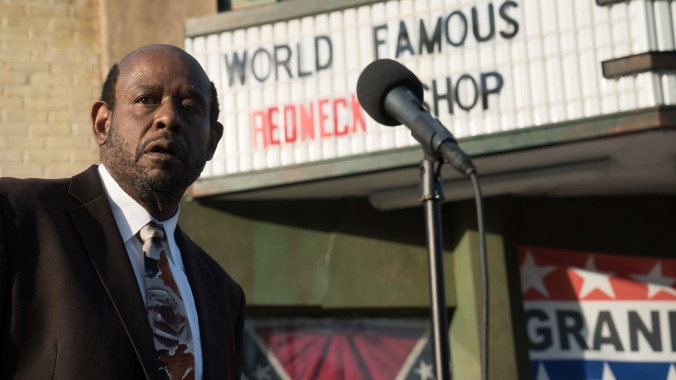In telling the story of ex-KKK member Mike Burden (Garrett Hedlund) and his rejection of the white supremacist ideology that once defined his life, Andrew Heckler manages to avoid a few of the more obvious stumbling blocks for a drama about racism from a white writer-director. Burden has to take the first step of cutting ties with the Klan before Reverend David Kennedy (Forest Whitaker), an idealistic Black minister with an unshakeable belief in nonviolent resistance, reaches out and offers shelter to him and his family. And the film makes it clear that Burden’s renunciation is merely the beginning of a process of rehabilitation, through which forgiveness—which is not guaranteed—has to be earned. But that’s the extent of the thoughtfulness in this overly simplistic piece of Southern poverty porn, which asks questions it’s not really prepared to answer and proceeds from a set of dubious assumptions that undermine whatever nuance it does possess.
Heckler’s first mistake is telling the story from Burden’s perspective rather than Reverend Kennedy’s. This means that we spend a significant portion of the film hanging out with Burden and his (proudly self-proclaimed) redneck buddies, in humanizing scenes where they break bread, fix cars, and generally show themselves to be more than the sum of their bigotry. In fact, the first act of Burden is so sympathetic to these men that it’s actually quite shocking when the first vile slur escapes their chaw-drenched lips. Kennedy, meanwhile, is introduced patiently mediating a racist dispute between a cashier and a customer at the local big-box store. Subsequent scenes featuring him and his family tend to hinge on discussions of the racism that’s infested their small South Carolina town, of which the construction of a KKK museum—to which Burden holds the deed, a gift from mentor-in-hate Tom Griffin (Tom Wilkinson)—is only the most visible manifestation. As a result, the story ends up lopsided, defining its Black characters by their struggle while giving the town’s racist whites a more fully formed humanity.
Then there’s the assumption that the love of a good woman can cure any malady, including violent racism. That good woman is played here by Andrea Riseborough, who brings typical range to her role as Judy, Burden’s live-in girlfriend and ultimate savior. But although Riseborough offers a more realistic working-class Southerner than the slack-jawed, staggering Hedlund, the thorniest and most complicated questions about her character also remain unaddressed. The film lets Judy off the hook for continuing to date Burden after finding out about his KKK ties, both explicitly in its dialogue and implicitly in its storytelling; the suggestion is that she’s not a racist herself, so it’s no big deal that she’s romantically involved with one. Much like Burden itself, Judy walks up to the line of accountability, only to turn away from the difficult questions when a simpler affirmation appears in their place.
Less significant, but equally puzzling, is the fact that Judy is living with the father of her young son Franklin (Taylor Gregory) when she and Burden meet. By the end of their impromptu first date a few scenes later, Dad has dissipated into deleted-scene purgatory, never mentioned or thought of again. Burden is detailed when it wants to be and cursory when it doesn’t, and Heckler’s passion for minutia mostly seems to come out at any opportunity to present South Carolina circa 1996 as an impoverished backwater. There’s nary a clean shirt, groomed beard, or unpeeled patch of wallpaper in this film—with the exception of the Kennedy residence, where modest fastidiousness reflects the spotlessness of its inhabitants’ souls.
Burden, which premiered at Sundance two years ago but is just now making its way to theaters, isn’t much to look at, either. There’s a lot of shaky handheld camerawork—a hoary cliché for this type of indie drama. Meanwhile, the editing privileges the temporary impact of cutting from, say, a burning cross to a bonfire prayer meeting over maintaining a consistent tone. The film is peppered with splashy stylistic moments, from a slo-mo breakdown in the rain to a grainy VHS overlay in a deposition scene. They’re all fine enough in the moment but don’t do anything to support the storytelling—an expected flaw, perhaps, in a film that has such a difficult time grasping the big picture.


 Keep scrolling for more great stories.
Keep scrolling for more great stories.
